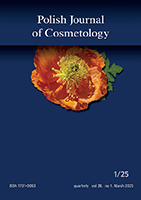search by
Copyright @ Pol J CosmetolThe epidermis keratinization - the effect of keratinocytes proliferation, differentiation and apoptosisKatarzyna Gojniczek, Magdalena Jurzak, Marta Boryka, Agnieszka Garncarczyk Zakład Kosmetologii Wydziału Farmaceutycznego z Oddziałem Medycyny Laboratoryjnej Śląskiego Uniwersytetu Medycznego w Katowicach Summary The epidermis keratinization is a genetically programmed, precise regulated process that leads to formation of completely cornified, superficial layer of the epidermis that protects human body against water loss, xenobiotics penetration and UV irradiation. After dividing in the basal layer of the epidermis, cells differentiate and move toward the outer skin surface. Keratinization process involves synthesis of new proteins and lipids necessary to form epidermis protective barrier. The most superficial layers of the stratum corneum are regularly shedded out from the epidermis surface. Based on keratinocytes physiology and morphology, in the epidermis four different layers can be distinguished: basal, spinous, granular and cornified layer. Aberrations in the epidermis keratinization can be caused by incorrect keratin and other proteins expression, inherited enzymatic defects in the epidermis cells, disturbances in cytokines and growth factors synthesis as well as free fatty acids deficit. Skin metabolism and epidermis keratinization process is also influenced by hormonal diseases, aging, diet, stress, fatigue and UV irradiation. Key words: epidermis keratinization, keratinocytes, cornified layer, turnover time (TOT), Rein´s barrier |




